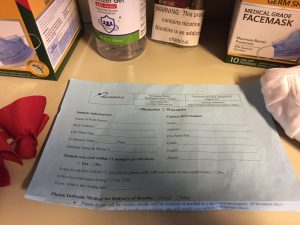Protecting Drinking Water in the Great Lakes
The Great Lakes make up 90% of North America’s fresh surface water and, in the US, 40 million people rely on the Great Lakes as their drinking water source. However, many in the Great Lakes region face threats to their drinking water — from contamination concerns related to lead pipes, harmful algal blooms or PFAS; to affordability concerns from the rising cost of water and the need to invest in aging infrastructure. River Network works to strengthen and expand the network of groups focused on drinking water and use new and existing tools to enhance the capacity of organizations to advocate for equitable access to clean, safe, and affordable drinking water in their communities.
With support from the C.S. Mott Foundation, River Network provided financial and technical assistance to four Great Lakes-based organizations in the development of their campaigns to address drinking water concerns in their communities. What none of us planned for, though, was the timely shift in planning and support needed in response to the COVID-19 pandemic. In partnership with Wellington Water Watchers (Guelph, Ontario), Junction Coalition (Toledo, Ohio), Interfaith Conference of Greater Milwaukee’s Interfaith Earth Network (Milwaukee, Wisconsin), and Minnesota Environmental Partnership (St. Paul, Minnesota), River Network helped shift the way drinking water education and community organizing happened on the ground throughout the basin.
Lead in Drinking Water

Lead Testing Form
Minnesota Environmental Partnership (MEP) and Interfaith Earth Network (IEN) both set out to inform and engage their respective communities on the issue of lead in drinking water. Existing data confirmed to both groups that lead is present in drinking water sources in their regions. While the outcomes of both projects were similar, the approaches were unique to each city.
MEP’s approach in Duluth paired a lead-focused policy platform with creating access to lead testing for families. “There is no safe level of lead in drinking water,” was the mantra of this effort. The official policy platform includes three asks to the City of Duluth: creating an inventory of lead service lines (LSLs), fully replacing LSLs, and securing free lead testing for families. While policy goals were being identified, MEP’s Northeast Organizer, Stephan Witherspoon, was knocking on doors to invite families to have lead testing done, and providing educational materials on mitigating lead in drinking water. Families that did have lead present in their home drinking water were invited to a community dinner to learn more and support each other moving forward. Though there is no safe level of lead, several homes were found to be above the EPA’s lead action limit of 15 parts per billion (ppb).
IEN’s approach also included supporting lead-focused policies (successfully allocating funds at the municipal level in Milwaukee for lead assessments and abatements in homes), but took to direct education when it came to engaging the community in conversations about lead. The Interfaith Conference, through IEN and the Coalition on Lead Emergency (COLE), rolled out a remote train-the-trainer educational model that reached various representatives of faith-based communities in the Greater Milwaukee area. Facilitators received training from IEN with the expectation to host their own educational events for their congregations, spreading lead contamination awareness to those that may be impacted. IEN is providing ongoing resources and water filters for trained facilitators to disperse in their communities.
Building a Broad & Inclusive Coalition
In Ontario, the Wellington Water Watchers are mobilizing to build the People’s Water Campaign (“Water For Life – Not Profit”) in an effort to create a sustainable and long-term vision for water justice. The campaign itself outlines three phases for action; phase one was completed over the summer of 2020 and included water education for emerging advocates, outreach to existing water protectors to invite partnership and peer learning, and a full-day virtual convention to kick off a community-wide conversation about water justice in Ontario. The convention, titled “Watershed 2020,” gathered over 200 attendees across the province and led to the development of a Living Water Justice Declaration, which will collectively guide the future of the People’s Water Campaign. This intentional coalition-building work is laying the foundation for collaborative and inclusive action in Ontario, allowing community members, tribes, and NGOs to access the knowledge and power building skills they need to create sustainable change.
Direct Community Response
Junction Coalition set out to develop a community education and water resource center in 2020, but quickly shifted their staff and volunteers to focus on direct COVID-19 relief for their community. Provisions of bottled drinking water, hot meals, and other food distribution took priority for the neighborhood. Also playing the role of community informant, internet hotspots were organized and funded throughout the community so neighbors could access Zoom and Google Hangouts for virtual gatherings, information sessions, and community meetings. While providing critical relief and information in partnership with other community organizations, Junction Coalition was also working diligently on a water shut-off moratorium in Toledo, providing education for community members to have their water service restored and reconnected during the pandemic, and successfully requested and received approval for full lead service line replacement from the City of Toledo (and a commitment from the governor of Ohio for full LSL replacement in favor of partial replacements).
Lessons Learned
Throughout the course of all four campaigns described above, organizations were tasked with constantly adapting to a changing political, social, and economic landscape. The COVID-19 pandemic demanded creative solutions to restricted community gathering and organizing, as well as innovative communication strategies to reach entire communities. We collectively learned some valuable lessons in 2020:
- Taking a step back to reassess what, why, and how work is done along the way was critical to adapting campaigns during the pandemic. Identifying what resources are available, who is able to participate, why specific outcomes are important, and the means by which goals are achieved helped keep campaign missions relevant and responsive.
- Addressing immediate needs alongside an organizational agenda helps secure space to build intersections between organizational goals and the needs of a community. This helps build trust, invites new interactions, and invites new partnerships.
- Creating access to information and resources during times of elevated stress is critical to successfully communicating with a community. Grantees provided community internet hotspots, reimbursement for attendance of workshops, financial compensation for taking on leadership roles, and direct food/water relief throughout their campaigns.
- Kicking it old school with phone calls, mailings, and door-knocking helped reach community members without (regular) access to the internet, or those unable to access virtual information due to other reasons. Intention to include those neighbors was important in reflecting the needs of the whole community.
- Inviting people to the table and listening deeply is more critical than most think (literally coming to the table for dinner, as MEP did; or virtually to share their stories, like Wellington Water Watchers).
For more information on these campaigns and to hear these leaders share their experience in their own words, view “Drinking Water: Community Action & Advocacy” from October 2020.






[…] Water Watchers in Guelph, Ontario (previously a C.S. Mott Foundation drinking water campaign grantee) is building on the momentum of their province-wide virtual summit “Watershed 2020,” and the […]